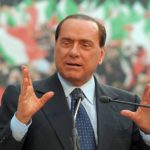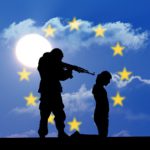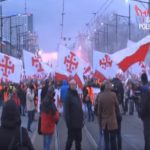The EU needs an administrator for Italy who will not destroy the euro. The deal is pretty obvious; the devil you know is better than the devil you do not.
On November 22, the judges of the European Court of Human Rights meet to evaluate the appeal against the ban imposed on Berlusconi to hold a public office, resulting from the application of a 2012 law (legge Severino) and a subsequent conviction for tax fraud in the 90s based on it. The sentence might come after months, but the consequences of the decision will determine Italian politics for the next few years and EU ones as well.
The last 5 years of Italian politics. Let us consider one question after another:
In the second half of 2011, Berlusconi was driven out of office as the spread between German and Italian bonds was rising to dangerous levels. He was replaced by a strongly pro-EU technocratic government, headed by Monti, (a university professor and former EU commissioner), that implemented harsh austerity measures, making Italy plunge into recession.
The Monti government was initially supported by Berlusconi’s center right and the center-left, a government of “national unity” out of necessity. Berlusconi, however, soon became increasingly critical of the technocrat.
Before the February 2013 election, a first sign of treason emerged. Berlusconi’s party belongs to the “European People’s Party” the center-right of EU politics. But the EPP declared that for the 2013 election, their candidate would be Monti himself, running with a centrist civic list, refusing to endorse Berlusconi. Continue reading →







 What has positive overtones in Poland (patriotism, faith, family), has negative ones in Western Europe and the other way round. Migrants, LGTBQ and gender mainstreaming is not welcome in the area between the Oder and Bug Rivers. The EU values cannot be farther from Poland’s values and vice versa. The Independence March denigrated by the Western media was favourably covered by the Polish government and other national media, except for those which are far to the left and very much pro-European. The former shored up the positive aspects of the event, the latter only looked for incidents to blow them out of any proportion and join the chorus of their western counterparts in condemning “fascists” and “white supremacists”.
What has positive overtones in Poland (patriotism, faith, family), has negative ones in Western Europe and the other way round. Migrants, LGTBQ and gender mainstreaming is not welcome in the area between the Oder and Bug Rivers. The EU values cannot be farther from Poland’s values and vice versa. The Independence March denigrated by the Western media was favourably covered by the Polish government and other national media, except for those which are far to the left and very much pro-European. The former shored up the positive aspects of the event, the latter only looked for incidents to blow them out of any proportion and join the chorus of their western counterparts in condemning “fascists” and “white supremacists”. 











